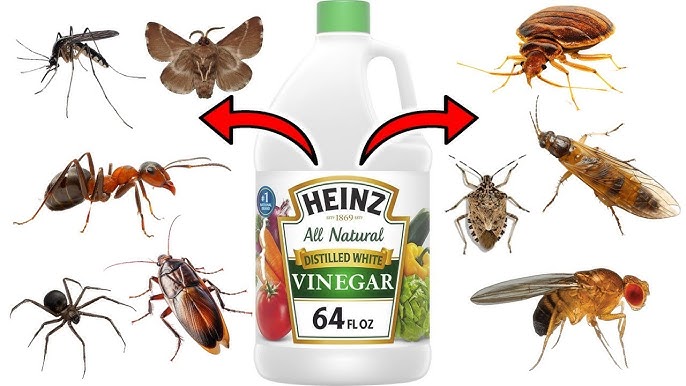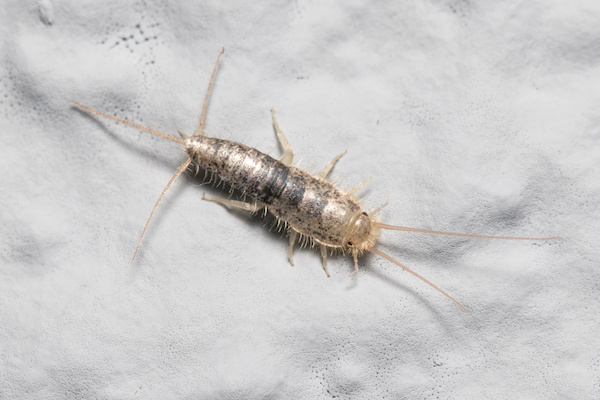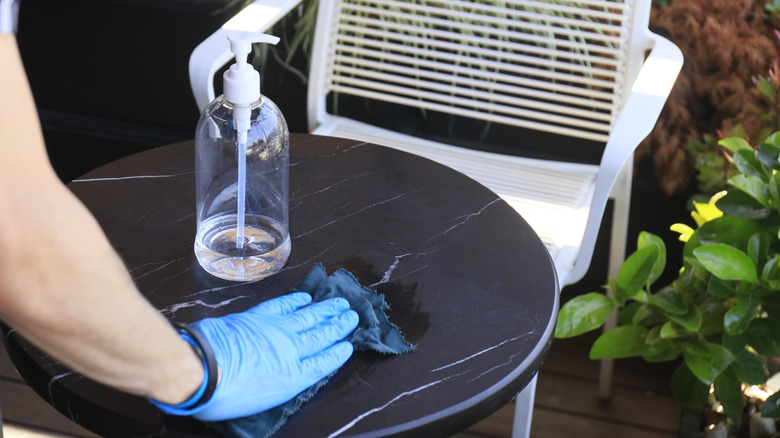Does Vinegar Repel Bugs? Discover the Truth and Effective Tips for Pest Control

Vinegar is a common household item known for its culinary uses and robust cleaning properties. But could it also serve as an effective pest repellent? Many people have turned to vinegar as a natural solution for controlling bugs, claiming it keeps various pests at bay. In this article, we will explore the truth behind vinegar's effectiveness in repelling bugs, examining the science, success stories, and practical applications. Whether you're dealing with ants, mosquitoes, or other unwanted critters, discover effective tips to incorporate vinegar into your pest control strategy and determine if it’s the right choice for your home.
Does Vinegar Repel Bugs?
Vinegar is often touted as a natural solution for various household problems, including pest control. The primary component of vinegar, acetic acid, has been shown to have repellent properties against certain types of insects. When sprayed around the home, vinegar can disrupt the scent trails of pests like ants and may deter flies and mosquitoes due to its strong odor. However, while vinegar may work as a temporary measure for some bugs, it is not a comprehensive solution for preventing infestations, and its efficacy can vary based on the type of bug and the concentration of vinegar used.
Types of Bugs Affected by Vinegar
Different bugs exhibit varying levels of sensitivity to vinegar. For instance, ants and fruit flies are often deterred by the strong smell of vinegar, which interferes with their ability to communicate and locate food sources. Additionally, vinegar can repel spiders and certain mosquitoes by masking scents they use to navigate. However, not all insects are affected; for example, vinegar is less effective against cockroaches and some other pests, highlighting the necessity of tailored pest control strategies.
How to Use Vinegar for Bug Repellent
To effectively use vinegar as a bug repellent, homeowners can create a mixture by combining equal parts of water and vinegar in a spray bottle. This solution can be sprayed in areas where insects are commonly seen, such as windowsills, doorways, and around food storage. It is recommended to reapply this solution regularly, especially after cleaning or rain, as its potency diminishes over time. The strong aroma helps in reducing the appeal of these areas to pests.
Comparative Effectiveness of Vinegar vs. Commercial Repellents
While vinegar is a popular natural alternative, its effectiveness can fall short compared to certain commercial bug repellents that contain proven active ingredients. These commercial products are often specifically formulated to target a broader range of pests and may offer longer-lasting protection. However, many people prefer vinegar due to its non-toxic nature and environmentally friendly profile, making it a safer option for household use, especially in areas frequented by children and pets.
Limitations of Vinegar as a Pest Control Solution
Despite its benefits, vinegar is not a foolproof solution for pest control. Its effectiveness can be limited by several factors, including the type of insect, the concentration of vinegar in the solution, and how it is applied. Additionally, vinegar does not eliminate bugs; it only discourages them from entering certain areas. For ongoing pest issues, more aggressive methods or professional pest control services may be necessary to address underlying problems and ensure long-term relief.
Home Remedies with Vinegar for Bug Control
In addition to its use as a spray, vinegar can be integrated into various home remedies for bug control. For example, placing small bowls of vinegar around the house can attract and trap flying insects such as fruit flies and gnats. Combining vinegar with baking soda can also create a cleaning solution that doubles as a deterrent for ants and other crawling bugs. These methods leverage vinegar's strong scent and acidic properties to complement other pest control strategies.
| Bug Type | Effectiveness of Vinegar |
|---|---|
| Ants | High |
| Fruit Flies | High |
| Mosquitoes | Moderate |
| Spiders | Moderate |
| Cockroaches | Low |
What bugs does vinegar keep away?

Vinegar is often touted as a natural insect repellent, primarily due to its strong odor and acidic properties. It can be effective against a variety of bugs, helping to deter them from homes and gardens. Here’s a detailed look at what bugs vinegar can keep away.
Ants
Vinegar is particularly effective at deterring ants. The strong scent disrupts their pheromone trails, making it difficult for them to follow paths to food sources. To use vinegar as an ant repellent, you can:
- Mix equal parts of water and vinegar in a spray bottle.
- Spray the mixture directly on the ants and trails.
- Wipe down surfaces to remove any traces of pheromones.
Fruit Flies
Fruit flies are attracted to fermenting fruits and vegetables, but vinegar, especially apple cider vinegar, can be used to trap them. The scent of vinegar attracts the flies while its composition prevents them from escaping. You can create an effective trap by:
- Filling a jar with a small amount of vinegar.
- Covering the jar with plastic wrap, securing it with a rubber band.
- Making small holes in the wrap to allow flies to enter but not escape.
Spiders
While vinegar may not kill spiders, it can act as a deterrent. The strong odor of vinegar is unappealing to spiders, making them less likely to inhabit areas sprayed with it. To use vinegar for spider prevention:
- Mix water and vinegar in a spray bottle, using a higher vinegar concentration.
- Spray around doorways, windowsills, and corners where spiders often build webs.
- Reapply every few days to maintain effectiveness.
Bed Bugs
Vinegar does not kill bed bugs on contact, but it can repel them. Its smell is unpleasant for these pests and can help keep them at bay. For using vinegar against bed bugs, consider the following:
See also:
- Spray vinegar directly on areas you suspect are infested.
- Soak bedding and infested areas with a vinegar solution.
- Combine with other pest control methods for better results.
Other Common Insects
In addition to the specific bugs mentioned, vinegar can also deter other common insects, such as mosquitoes, cockroaches, and moths. Its strong scent is generally unappealing to most insects. You can apply vinegar for general pest control by:
- Mixing vinegar with water to create a spray solution.
- Using vinegar-soaked cotton balls in areas where you see signs of pest activity.
- Combining with essential oils for an enhanced repellent effect.
What insects are attracted to white vinegar?

White vinegar is a common household item known for its versatility, but it also has properties that attract certain insects. Here is an overview of the insects attracted to white vinegar and their characteristics.
Ants
Ants are often drawn to white vinegar for its strong scent, which helps them locate food sources. This attraction can be particularly useful when trying to eliminate an ant infestation in your home.
- Food Source: Ants are constantly searching for food, and the smell of vinegar can attract them when it is mixed with other substances.
- Vinegar as Bait: A mixture of vinegar and sugar can be used as an effective bait for trapping ants.
- Repellent Properties: While they are attracted to the smell, vinegar can also act as a natural repellent when used in high concentrations.
Fruit Flies
Fruit flies are particularly fond of white vinegar, as it mimics the smell of fermented fruits, their primary food source.
- Life Cycle: Fruit flies lay eggs on fermenting fruits, and vinegar provides a similar scent that attracts adults.
- Vinegar Traps: A simple trap can be made using a bowl of vinegar covered with plastic wrap and holes in it, attracting and capturing the flies.
- Breeding Sites: Keeping areas clean and free from decaying fruits is essential, as vinegar's aroma can signal breeding opportunities.
House Flies
House flies can also be attracted to white vinegar, especially when it is mixed with food scraps. These flies are typically looking for organic matter to feed on.
- Attractive Odor: The pungent odor of vinegar mixed with food scraps can attract house flies, making it a suitable bait for traps.
- Control Measures: Utilizing vinegar in fly traps can help manage house fly populations around food preparation areas.
- Sanitation: Maintaining cleanliness and proper waste disposal can minimize the chances of attracting house flies.
Wasps
Wasps may also show interest in white vinegar, particularly towards the end of summer when their food sources dwindle.
- Fermentation Preference: The scent of vinegar can resemble fermenting fruit, drawing wasps in search of food.
- Attractant in Bait Traps: Vinegar can be used in homemade traps alongside sugar or fruit juice to lure wasps effectively.
- Deterring Strategy: Strategic placement of vinegar traps away from human activity can help manage wasp populations while avoiding encounters.
Cockroaches
Interestingly, cockroaches may also be attracted to white vinegar, particularly when it is used in cleaning products or mixed with sugary substances.
- Food Attraction: The sugary or food-like scent in diluted vinegar can attract cockroaches, making them seek it out.
- Dissuasive Measures: While they may be attracted to it, vinegar can also be used as a cleaning agent that repels cockroaches when used on surfaces.
- Preventive Steps: Improving sanitation and using vinegar as a cleaning solution can deter cockroaches effectively by removing food residues.
Why spray vinegar on your porch?

Spraying vinegar on your porch can offer several benefits, primarily related to cleaning, pest control, and maintenance. Vinegar is a natural and effective solution for various household issues, making it a popular choice for homeowners looking to use eco-friendly products.
1. Cleaning Surface Stains
Using vinegar as a cleaning agent helps to tackle tough stains on your porch surfaces. The acetic acid in vinegar dissolves dirt and grime effectively, making it easier to achieve a fresh look.
- Stain removal: Vinegar can break down organic materials, making it effective against coffee, food, and other stains.
- Disinfecting: Vinegar has antibacterial properties, which can sanitize the area, reducing the presence of germs.
- Non-toxic solution: Being a natural product, vinegar is safe to use around pets and plants, unlike some chemical cleaners.
2. Repelling Pests
Vinegar can be used as a natural deterrent for various pests, including ants, spiders, and flies. Spraying vinegar can create an environment that is less inviting for these unwanted guests.
- Ant prevention: Ants are often repelled by the scent of vinegar, which can discourage their return to your porch.
- Flea control: Vinegar can help combat fleas that may infest your outdoor sitting area, providing better comfort.
- Spider repulsion: The strong smell of vinegar can deter spiders, helping keep your porch clear of webs.
3. Mold and Mildew Prevention
Vinegar can be effective in preventing the growth of mold and mildew on your porch, especially in areas with high humidity or moisture.
See also:
- Anti-fungal properties: The acidity in vinegar can inhibit the growth of fungi, keeping surfaces cleaner.
- Seasonal application: Regular application of vinegar can help maintain a mold-free environment throughout different seasons.
- Easy application: Just spray vinegar on affected areas to help prevent future mold growth and maintain appearance.
4. Deodorizing
Vinegar can neutralize odors, making it beneficial for keeping your porch smelling fresh. Whether it’s from food, pets, or general outdoor smells, vinegar can help combat these.
- Neutralizing odors: Vinegar works to neutralize foul odors rather than just masking them.
- Fresh air: A spray of vinegar can refresh the air, providing a clean and inviting space for gatherings.
- Cost-effective deodorizer: Using vinegar is a budget-friendly way to maintain pleasant scents indoors and outdoors.
5. Eco-Friendly Alternative
Choosing vinegar as a cleaning and maintenance solution aligns with a growing trend towards eco-friendly practices in home care.
- Chemical-free: Vinegar is a safe alternative free of harmful chemicals found in many commercial cleaning products.
- Biodegradable: Vinegar breaks down naturally, posing minimal harm to the environment compared to synthetic cleaners.
- Multi-purpose use: Besides cleaning, vinegar can also be used in various culinary and gardening applications, making it versatile.
How do you make bug repellent with vinegar?

To make bug repellent with vinegar, you can create a simple yet effective solution using common ingredients. Vinegar is known for its strong smell, which is a natural deterrent for various insects. Here's a guide on how to prepare this homemade bug repellent.
Ingredients Needed
To create your vinegar bug repellent, you will need the following ingredients:
- White vinegar or apple cider vinegar
- Water
- Essential oils (optional, but recommended for enhanced effectiveness)
- A spray bottle for application
Preparation Steps
The preparation of your bug repellent is straightforward and can be completed in just a few steps. Here's how to do it:
- Mix one part vinegar with one part water in the spray bottle.
- If desired, add a few drops of essential oils like peppermint, lavender, or eucalyptus.
- Shake the bottle well to ensure all ingredients are combined.
Application Tips
Using your homemade vinegar bug repellent effectively is crucial. Here are some tips on how to apply it:
- Spray directly onto exposed skin, avoiding the facial area.
- Reapply every few hours or after sweating or swimming.
- Use it around doors and windows to create a protective barrier against insects.
Effectiveness Against Different Pests
The effectiveness of vinegar as a bug repellent can vary based on the type of pests you are targeting. Here's a breakdown:
- Ants: Vinegar disrupts their scent trails, deterring them from entering your home.
- Flies: The strong smell of vinegar is unappealing to flies, making it a deterrent.
- Mosquitoes: While not as potent as some commercial repellents, vinegar can help reduce their presence.
Storage and Shelf Life
Proper storage of your vinegar bug repellent will help maintain its effectiveness. Follow these guidelines:
- Store the mixture in a cool, dark place to prolong its lifespan.
- Shake well before each use to ensure the ingredients are mixed.
- Use within a month for optimal freshness and effectiveness.
Questions from Our Readers
Does vinegar effectively repel bugs?
Vinegar is known to have some repellent properties against certain types of bugs, particularly ants and fruit flies. Its strong smell can disrupt the scent trails that ants use to communicate, making it harder for them to navigate. However, it may not be effective against all pests, so its effectiveness can vary depending on the bug.
What types of bugs are repelled by vinegar?
Vinegar is especially effective against ants, fruit flies, and some other small flying insects. The acetic acid in vinegar creates an environment that many pests find unappealing, but larger insects like cockroaches or mosquitoes might not be deterred by it.
How should vinegar be used to repel bugs?
To use vinegar for bug repellent, mix equal parts of vinegar and water in a spray bottle. Spray this mixture around entry points, surfaces, and areas where you've noticed insect activity. Reapply regularly for the best results, especially after cleaning.
Is vinegar safe to use around pets and children?
Yes, vinegar is generally safe for use around pets and children. However, as with any cleaning or pest control method, it's wise to ensure that the area is well-ventilated and avoid using excessive amounts in a confined space, as the strong smell might be unpleasant for sensitive noses.
See also:

If you want to read more articles like Does Vinegar Repel Bugs? Discover the Truth and Effective Tips for Pest Control, we recommend you check out our Insects category.
Leave a Reply
Related Articles